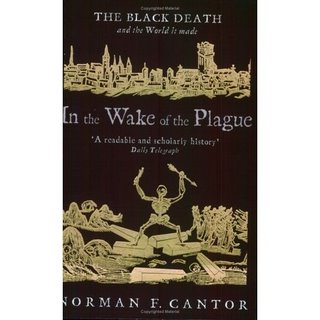
The topic is certainly fascinating, but I didn’t like this book all that much. Cantor goes through the history of the plague, focusing on England (which has the most extensive written record). First (and deadliest) wave of plague peaked around 1350. Sounds like the plague occurred after a period of warmer weather and population growth that had resulted in placing more marginal ground under cultivation; this was reduced for literally centuries.
The plague occurred during the course of the 100 years war, making recruitment more difficult. Labor was short, peasants made some gains economically, and some even moved up socially to yeoman status.
This author thinks it was anthrax combined with bubonic plague. There was a bunch of discussion about rats spreading the disease.
The author's bio is here.
He thinks the plague contributed to the development of modern real property law – the landed gentry suffered huge losses (sometimes resulting in several dowagers taking a portion of the income). So they needed lawyers to sort things out. Author says you could thaw out a 14th century real property lawyer, give him (it would have been a him, after all) a six-month refresher course, and put him to work today. Maybe it’s true, I don’t practice in this area. My law school course on this topic was pretty archaic.
Then the author goes off on some tangents about disease. Says bubonic plague – which did hit portions of the Roman empire in the fifth century – was largely responsible for the fall of the empire. Funny, the fella writing the book mentioned immediately below must not have been aware.
This is my second book by this author (“Inventing the Middle Ages,” discussed here) and he’s dropping down the priority list. In this one, it felt like he was forcing a cause-and-effect between the plague and all sorts of things. But then again, who knows.
No comments:
Post a Comment